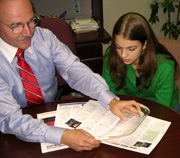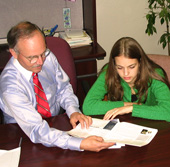What is the school counselor’s responsibility in the transition planning process?
Page 5: Transition Assessments
 To guide the transition process, school personnel use the results of a variety of assessments in conjunction with the student’s measurable post-secondary goals. These transition assessments involve the continual collection of information about a student’s strengths, needs, preferences, and interests. The IEP team uses the assessment results to identify appropriate measurable goals and the transition services that need to be included in the student’s IEP.
To guide the transition process, school personnel use the results of a variety of assessments in conjunction with the student’s measurable post-secondary goals. These transition assessments involve the continual collection of information about a student’s strengths, needs, preferences, and interests. The IEP team uses the assessment results to identify appropriate measurable goals and the transition services that need to be included in the student’s IEP.
Areas of Data Collection
Although school personnel could assess a myriad of skills, they typically categorize all of the options as personal, educational, or vocational. By combining assessments that address these different categories, personnel obtain information on a student’s current performance and identify those skills needed for the future. As with all areas of the IEP, the team must determine on a case-by-case basis which assessments to give students.
| Transition Assessments | ||
| Categories | Skills | Uses |
| Education/ Training | Academic strengths, educational needs, and communication skills |
|
| Employment | Interests, aptitudes, and work-related values |
|
| Independent Living/ Personal | Social, behavioral, and life skills |
|
Formal and Informal Transition Assessments
School personnel should use a combination of formal and informal transition assessments to obtain a comprehensive picture of a student’s skills.
- Formal assessments – surveys and tests that are standardized for a particular group of students (e.g., vocational inventories, college entrance exams)
- Informal assessments – a process of gathering information from resources other than standardized assessments (e.g., medical records, work samples, classroom observations, interviews with teachers)
Listen to Ginger Blalock discuss both formal and informal assessments.

Ginger Blalock, PhD
Professor Emeritus, Department of Special Education
University of New Mexico
Formal
Transcript: Ginger Blalock, PhD
Formal
Formal career assessments are the repertoire of assessment tools and procedures that exist that have been standardized on different populations. And typically those fall into three categories that are of greatest importance to these students. One would be looking at career aptitudes, and we have lots of standardized tests on those that are available from a variety of sources, such as the government or commercial publishers. In addition, we have career interest inventories, and those have been published after being standardized with a variety of nationwide populations, again available from the government or from commercial publishers. We have the guidance software program that many high schools and even post-secondary institutions use which help students get online and do some self assessments to see what their interests might be and then go branching to discover what kinds of career opportunities are out there, what kinds of specific jobs might be available they hadn’t thought about, and what kinds of post-secondary training opportunities could get them there. In addition to the interest inventories I just described, there are a number of them that have been researched and published that are non-reading interest inventories also, for students who have severe reading disabilities, or students who have mental retardation, or students who have communication disorders and they need more of a pictorial kind of choice system. And the third kind of more formal career assessment that is really useful with these students is work-related values in the inventories. And there are a couple of those that are commercially available.
Transcript: Ginger Blalock, PhD
Informal
I think the most valuable informal career assessment is just to interview the young person, the learner, particularly at the middle school and high school level, about a range of things. Again, how do they like to spend their free time, what do they like and dislike in school, but what are their goals for themselves? How do they see themselves in five years or ten years or twenty years? What are some dreams they used to have in elementary school that they don’t have anymore? So it’s just the common sense questions that will help the teacher or the transition specialist or whoever’s doing this assessment figure out that really motivates the learner. For students who have difficulty with abstract thought or communication, a number of folks have come up with just force choice questions, things like, “Would you prefer to sweep a floor or pick flowers?” And then to go through a series of questions like those that have you narrow down the options that an individual who has difficulty communicating might be able to find out for themselves.
Guidelines for Administering Assessments
 Professionals who conduct transition assessments should be knowledgeable and experienced in administering and interpreting a wide range of assessment tools. While professionals with specialized training, such as school psychologists, are qualified to administer certain assessments (e.g., intelligence tests), school counselors may be the ones to administer the majority of transition assessments if their qualifications allow. Factors such as district size or school policies can affect whether school counselors administer transition assessments. Assessments should be:
Professionals who conduct transition assessments should be knowledgeable and experienced in administering and interpreting a wide range of assessment tools. While professionals with specialized training, such as school psychologists, are qualified to administer certain assessments (e.g., intelligence tests), school counselors may be the ones to administer the majority of transition assessments if their qualifications allow. Factors such as district size or school policies can affect whether school counselors administer transition assessments. Assessments should be:
|
|
Transition Update - Determining Sandra's Assessments

Mr. Hunter explains that the IEP team has requested that Sandra take several assessments that will help them to develop a transition plan for her life after high school. In mapping out which assessments Sandra will need over the years, Mr. Hunter needs to identify what skills related to the healthcare field Sandra currently possesses and what skills she will need to build on in order to attain her post-secondary goals. The information he gathers will help the IEP team identify possible career options for her in the healthcare field.